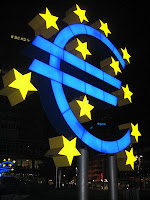 The chancellor will at lunchtime announce a super-tax on banks that pay big bonuses (no surprise there, given how much I have been banging on about it). It will have an impact on hundreds of banks operating in the UK of all nationalities.
The chancellor will at lunchtime announce a super-tax on banks that pay big bonuses (no surprise there, given how much I have been banging on about it). It will have an impact on hundreds of banks operating in the UK of all nationalities.The special one-off levy will make it very expensive for those banks to pay big bonuses to thousands of bankers based in Britain.
Later today, in the pre-Budget report, the chancellor will say that if banks pay bonuses to individual bankers over a specified fairly low level - perhaps £10,000 - that will trigger a special one-year-only tax for those banks. The tax payable will be calculated by adding together all those big bonuses and then levying a charge on the aggregated sum of those big bonuses. The tax rate for the bank on that pool of bonuses would be more than 50%. Which will make it very expensive for the banks to pay the bonuses. So although the Treasury expects to raise a few hundred million pounds from the levy, it would not be wholly surprised if the take were less substantial - in that the banks could decide this is not a great year to pay bonuses. What is particularly striking is the sheer number of banks - hundreds - that will be affected: the tax will hit British banks as well as overseas banks with subsidiaries or branches in London.
It means that banks from Britain's Barclays, through France's BNP Paribas, to Goldman Sachs of the US will all be affected.
It will cause a furore in the City, because no other country has announced such a super tax on bonuses.What's more, the chancellor is likely to say that if he sees banks systematically taking clever steps to avoid the tax - by temporarily pushing up the basic pay of employees, for example - he would expect the Inland Revenue to be aggressive in preventing that and would not hesitate to legislate to close down the avoidance schemes.
This is a big moment for the City of London.
Some will say that banks and bankers are rightly being punished for the economic and financial havoc they caused by their reckless lending and investing. Others will warn that the competitiveness of a vital British industry, finance, may be harmed - and that we could all be the poorer.
UPDATE, 11:11: Perhaps the best way to see the proposed super-tax on bonus-paying banks is as a semi-voluntary windfall tax.
If banks choose to pay big bonuses, they will pay the tax. If they decide against paying big bonuses, they won't pay it.
The chancellor is in effect saying that much of banks' profits in 2009 have been a windfall, or a gift from the state generated by the exceptional financial and economic measures taken by the Bank of England and the Treasury to resuscitate the economy and financial system.
These profits should be deployed to strengthen the banks by being retained as capital, Mr Darling is insisting. But if the banks choose to reduce their profits - and tax - by paying out a proportion of the profits as fat bonuses, then he will get his mits on a fat slug of this putative windfall through his new one-off super-tax. So there is a stark choice for banks' boards and their shareholders.
They can ask their top executives to make a financial sacrifice for a year for the financial health of the bank. Or the banks can suffer a big financial hit so that the members of the bond or forex desks can buy another Ferrari or several.
It's a tough one. What fascinates me is how the tax will affect the behaviour of banks and bankers.
The Treasury clearly believes it has constructed the tax in a way which creates little incentive for individual bankers to move abroad or move firms - since the tax would be paid by the bank not the banker.
And since the tax will last no longer than a year, it should not be sufficient to persuade the banks themselves to re-locate to Paris, Frankfurt or Geneva - which are still at a disadvantage to London in respect of skills and tech infrastructure.
What's more Dubai isn't quite the competitive threat as a financial centre that it might have appeared to some a year or so ago.
So the City will doubtless scream blue murder about the tax, because banks and bankers are being hit where it hurts most - in the pocket.
But the bankers to whom I've spoken in the past few days about all this say that the City has survived much worse.








